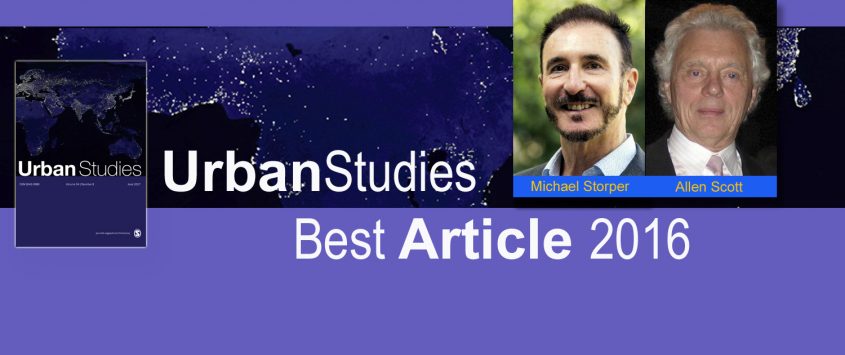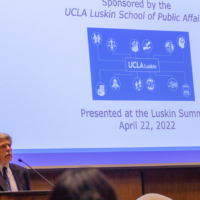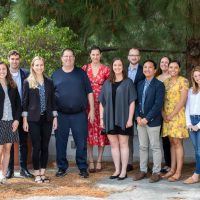
Paper on Nature of Cities Earns Accolades UCLA Luskin scholars Michael Storper and Allen Scott are recognized for their agenda-setting critical assessment of current urban theory
By Stan Paul
The majority of the world’s people live in cities, and numerous theoretical approaches from diverse fields have suggested frameworks for thinking about urbanization and the complexity of the urban form.
Now, two UCLA Luskin School of Public Affairs scholars are being recognized for seeking to frame those approaches as a common language, or foundational concept, for the study of urbanization, an effort that has further enlivened and deepened an ongoing debate. It has also sparked a bit of controversy.
Michael Storper of the Department of Urban Planning and his longtime colleague and collaborator Allen J. Scott have been selected by the journal Urban Studies as recipients of the Best Article award for 2016’s “Current Debates in Urban Theory: A Critical Assessment.”
The journal’s website explains that the Urban Studies Best Article designation is awarded by the editors and authors to the most innovative and agenda-setting article published in a given year. Mark Stephens is editor of the international journal, which was established in 1964 and is published by SAGE. The winning article was selected in a process that narrowed a field of 20 initial candidates to five before the final selection was made.
Storper is a distinguished professor of regional and international development at UCLA Luskin, and Scott is a distinguished professor emeritus of public policy and geography. Their article proposed an analytical framework for urban studies while strongly critiquing three existing and influential perspectives: postcolonial urban theory, assemblage theory and planetary urbanism.
Storper, who also holds academic appointments at the Institute of Political Studies (Sciences Po) in Paris and the London School of Economics, noted that this was the second paper on this subject in collaboration with Scott. In the earlier paper, the two UCLA professors had argued for a different approach, generating vigorous debate that led proponents of competing theories to offer their own critiques in response.
The newest paper addresses those critiques and offers further explanation by Storper and Scott. In the journal article, they wrote: “We claim that there are fundamental common genetic factors underlying urban patterns, and a robust set of conceptual categories within which urbanisation processes and urban experiences can be analysed, wherever they may occur in the world.”
Storper and Scott considered high levels of diversity and disagreement over the last century, writing “we asked if a coherent, stable theory of the city could be constructed.” Such a theory would need to accomplish all of the following: “account for the genesis of cities in general, capture the essence of cities as concrete social phenomena, and make it possible to shed light on the observable empirical cities over time and space.”
The authors identify and put forth five basic variables, or forces, that shape what they refer to as the “urban land nexus” at different times and places. These include:
- the overall level and mode of economic development;
- prevailing resource allocation rules;
- forms of social stratification;
- cultural norms and traditions;
- and relations of political authority and power.
In refuting other theoretical formulations of what defines urban, Storper and Scott further conclude: “Not only does our analysis provide us with the tools for distinguishing between the general and the particular in urban outcomes, but also for separating out that which is distinctively and inherently urban from the rest of social reality.
“We must distinguish between phenomena that occur in cities but are not generated by urbanization processes as such, and phenomena that are legitimately elements of cities in the sense that they play an active role in defining the shape and logic of urban outcomes.”
The full article and lists of other finalists and previous winners are available online, as is a video explanation by Storper.









Leave a Reply
Want to join the discussion?Feel free to contribute!